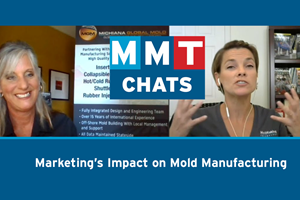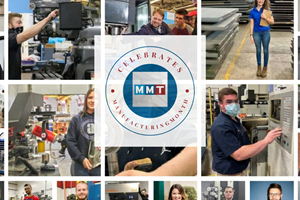Two Strategies for Securing Skilled Labor
A number of mold manufacturers reveal their clever solutions to the workforce development dilemma—from hiring retirees to recruiting the young.
Many mold manufacturers are tasked with the challenge of finding skilled talent as todays’ seasoned moldmakers ready themselves for retirement, schools stop offering moldmaking-related curriculum and many young people believe there is a negative stigma attached to manufacturing. As a result, some mold shops are reaching out to their retirees, venturing into high schools, and also looking to quickly train employees in entry-level positions. Here is a look at what some are doing.
1. Bring Them out of Retirement
Dave Martin, President of Portage, MI-based Accu-Mold, Inc., notes that he has hired several retirees, depending on workflow, by networking through high school parents and calling guys he knew retired early from the local Pfizer and GM plants. “We are finding some retirees who started in automotive at 17 or 18 and retired at 52ish under early offerings and got bored after a couple of years of having freedom,” he notes. “We offer a much better environment—air conditioning, small company, great teamwork—than big auto plants.” Martin also offers them full benefits, including 401Ks.
Steve Scott, retired from GM Stamping as a journeyman die maker, is Accu-Mold’s part-time CNC set-up guy. “There are many incredible people that retired early from industries like auto that found out they still like to work,” Scott comments. “I have learned a lot of new technology that we have here that was not available in my time at GM.” Martin adds, “Steve has a great attitude and very reliable. We are happy to have his dedication and teamwork. Some people call them ‘old guys’ I call them experienced pros.”
CS Tool Engineering, Inc. (Cedar Springs, MI) has one retiree he has known for the past 30 years that works a few times a year—for one to several months at a time—to assist with spikes in the work flow, notes Operations Manager Don Snow. “Ken Gager grew up in the model making trade and learned CAD/CAM at an older age than most people,” Snow comments. “The neat thing about Ken is his understanding of parting lines and draft requirements. He has helped us out in the areas of implementing engineering changes into current solid model designs—which keeps our full-time guys focused on larger projects. He has also been a big help in the area of electrode modeling as he understands areas that can be machined versus those that need to be EDM’d.”
Gager enjoys the sense of accomplishment that comes from working and creating something, as well as the ability to still contribute to the workplace. “It also keeps my mind active and helps keep it from growing old,” Gager notes “Working with the younger employees helps keep your outlook on life more upbeat and positive. And lastly, earning a few extra dollars doesn't hurt a bit.”
Over at LS Mold, Inc. (Holland, MI), its President Larry Koning reports the company retains three retirees—two that work between 16 and 20 hours a week and the other one between 24 and 30 hours a week. “We bring them in a few days a week, making sure they don’t log in so many hours that they lose their benefits,” he says. “They fill in the holes we need, and at the same time we don’t have to pay their health insurance.”
Two of the three retirees are company truck drivers, Koning continues. “One works two days and the other works three. “The two-day guy was a 30-year employee who was a moldmaker before he retired,” he notes. It is a perfect opportunity for him to get out of the house and make a little money; and I have a guy who is very capable and familiar with handling plastic injection molds. It really is the best of both worlds.”
The third retiree—who also was a toolmaker for the company for 35 years—is happy to come in from time to time to do some toolmaking, Koning adds. “He makes a little money and is able to see the guys,” he notes.
Electroform Co. (Rockford, IL), also has a former retired employee, Jim Brancato, working three days a week. “I feel with that generation there is a lot of passion for the industry still,” Electroform President Wade Clark states. “They still enjoy the shop. It keeps them active. They enjoyed their careers; and I think it’s also nice for them to know they can stop working whenever they would like to.”
Brancato does some project management as well as estimating. “I didn’t want to just walk away from a job not knowing what the future would bring,” Brancato says. “I love it. It gives me the opportunity to keep in contact with clients and people in the shop, and also have free time. It is working out great.”
Martin, Snow, Koning and Clark concur that having retirees work in the shop has had a positive impact on their companies as a whole. “The guys don`t mind at all when the retirees come in,” Koning states. “Most of the time they ask. If a toolmaker is behind in a job it is a nice way to pick up time—and also keep the job in-house.”
2. Grow Young Talent
At the other end of the spectrum, several shops are targeting America’s youth to address the skilled labor shortage. Paul Ziegenhorn, President, Matrix Tooling, Inc./Matrix Plastic Products (Wood Dale, IL), notes that the company prefers to start with young people—particularly those with a good attitude and an interest in learning. He looks to trade associations like the AMBA and the Tooling and Manufacturing Association (TMA) as well as Austin Polytech Academy to find young employees. “We have hosted summer camps, offered internships, hosted numerous local high school tours, career nights, and the like,” he states. “All give us opportunities to meet young prospects, parents and educators. The last two (parents and educators) are critical, as we have to sell them on the benefit of a career in manufacturing.
“We develop them as apprentices, and then move them throughout the various departments to give them as broad a background as possible,” Ziegenhorn continues. “They receive ‘hands-on’ training by working with our more experienced leadmen moldmakers and machining specialists, and also attend related theory courses at night through the Tooling Machining Association (TMA).”
While Ziegenhorn acknowledges the company is “not breaking new ground,” he notes these are “tried and true” methods for grooming future talent. “For some reason, our industry has dropped the ball on training—which is an absolutely sure-fire way to ensure a shortage of future talent,” he states. “Our success to date has been much higher with hiring someone with less experience, but a hunger for learning.”
Brandon McConnell, who joined Matrix Tooling last September is an example of a “hungry” apprentice. Steve Groth, one of Matrix Tooling’s Lead Moldmakers, notes that Matrix looks for its apprentices to be self-motivated and hard working. “They should be able to learn from their mistakes and want to improve their skills with every new task they perform,” he states.
Matt Radley, Matrix’s EDM Supervisor who also is involved in training its apprentices, adds, “Important qualities in an apprentice include great math, technology, and communication skills, an open mind with a great work ethic, problem-solving ability and a strong willingness to learn."
Matrix Shop Manager Mike Martin also weighs in. “To be successful, new hires need to exhibit a strong work ethic and have the desire to learn,” he comments. “An inexperienced apprentice with a motivated attitude is more likely to succeed than an apprentice that comes in with basic machining skills but is less motivated. When hiring apprentices, we look for enthusiasm, good problem-solving skills and common sense."
Brad Rusthoven, Personnel Manager for Franchino Mold (Lansing, MI) has been instrumental in reviving the company’s four-year apprenticeship program that had lapsed in the late 90s due to lack of interest. “We are hiring inexperienced people and training them ourselves through our mentoring and apprenticeship programs,” he says. “We currently have two apprentices attending Lansing Community College and nine mentor/mentee relationships.” Franchino Mold also reimburses employees their tuition money once they have been with the company for a year and successfully completed the courses. Rusthoven adds that Franchino Mold also has employees do online training at Expert Technical Training (expert-technical.com).
Electroform is “always growing and looking for good people,” Clark notes. With openings in every department, he admits that finding qualified employees is an ongoing challenge he faces and he has been bringing younger talent into the shop. He believes that today’s youth needs direction. “It seems like a great deal of training stopped in the 80s,” he affirms. “There are young people out there looking for work, you just have to seek them out. As far as our trade, it’s a lot more demanding today with regards to delivery time, and there’s a lot lets tolerance for mistakes and that makes the hiring process more of a challenge.
“Fortunately I have a good pool of people to pull from,” he continues. “Not only do we rely on word of mouth, but we are located near smaller farming communities, and it’s great to be in a manufacturing area where there is plenty of manufacturing ‘genetics.’ If the father is a manufacturing kind of guy, chances are it runs in the family. We are able to find people here with an aptitude for manufacturing—and that is most important to us.”
Clark adds that the company picks up a few people each year, which helps Electroform’s “slow but manageable” growth. He plans on reaching out to local high school this year to potentially bring younger people on board to complement the skills of his “veteran” employees. “My employees understand we need the younger generation with their computer skills,” he emphasizes. “They appreciate that, and respect the younger adults and the new energy they bring to the job. It is exciting for them to have the ability to pass on their skills. They know they are valued here and the younger generation can’t replace them; rather they have complementary skills.”
CSTE’s Snow also relies on word-of-mouth to fill positions. “Usually someone who works here knows someone who might fit our need,” Snow notes. “Currently, to find an experienced CAD/CAM technician or moldmaker is very difficult. There isn't an abundance of people looking to change jobs with the current demand and those people who left the ‘automotive’ Michigan for another state are not moving back. We have been privileged to bring on some high school graduates as apprentices the past couple of years and continue to spread the word about opportunities in the moldmaking trade. We have also partnered with Expert Technical Training to help us with training our new employees.”
Martin of Accu-Mold’s notes that his company has become involved with local college Kalamazoo Valley Community College’s fast track training program (see Fast Track Programs sidebar, page xx). “This program provides people an easy way to gain entry-level skills that we want as manufacturers,” he states. “It is an innovative way to solve the lack of skilled trades’ applicants for growing companies in moldmaking and machining.
Accu-Mold also works with a local high school’s (Vicksburg) Education for Employment Computerized Manufacturing co-op. Senior Wyatt Van Fulpen, in his second year at Accu-Mold, attends this class and works part-time. According to Martin, Van Fulpen loves working with the "number one draft picks” and 25 to 30 year journeymen at Accu-Mold. “There is so much that is not in the book that we are downloading and young people should take advantage of it,” Van Fulpen enthuses. “I get to work day shift in an air-conditioned atmosphere with all computerized high-tech machines and software programs, along with learning the manual machines. These guys know so many little things that make a huge difference in outcomes of our molds.” Martin adds that Van Fulpen plans to keep working at Accu-Mold while studying the Engineering Technology program at Western Michigan University. “Wyatt is a young man who stays on task so it is very motivating for our veterans to work with him,” Martin says.
Martin of Accu-Mold is hopeful that all of the aforementioned efforts will be successful—whether mold manufacturers rely on the experience of retirees or grow their own younger talent. “We are using all of these ‘weapons’ to develop the new talent that is needed,” he concludes. “We need to recruit retirees, look at ‘boot camps’ at universities for unemployed or undecided HS students to fast track them, and reach into the youth programs and counselors to get students excited about sophisticated manufacturing and rebranding it. Today’s world of manufacturing is a career—not a job!”
Fast-Track Programs
Perhaps mold manufacturers looking to find skilled workers should consider looking for potential employees who have taken a “fast track” or “boot camp” program—accelerated courses designed for those with basic moldmaking or machining experience that quickly brings them up to speed regarding training on basic equipment. Below are details on three such programs.
M-TEC
M-TEC (Lake Michigan College; Benton Harbor, MI; lakemichigancollege.edu), funded in part by the Michigan Economic Development Corporation (MEDC; michiganadvantage.org), is focused on the training needs of area industry and their current and potential employees. Classes include CNC Basics I and II, Introduction to SolidWorks and Welding Basics.
M-TEC Director Ken Flowers points out that the program was developed several years as an alternative to the traditional college training method or four-year apprenticeship program. “We need employees today and taking a few classes at a time over several semesters is a lengthy process,” he comments. “We decided to recruit individuals with some manufacturing experience and give them 120 hours of training.”
CNC Boot Camp
CNC Boot Camp at Waukesha County Technical College (WCTC; Waukesha, WI; wctc.edu)—coordinated by the agency Wisconsin Regional Training Partnership (WRTP; wrtp.org)—is geared toward training workers with little or no experience into entry-level CNC operator positions. The 200 hours of training received is a combination of work on CNC machining centers, CNC turning centers, manual machine operation, blueprint reading and math.
According to Moldmaking/CNC Instructor Robert Novak, courses average between 12 to 16 participants, with a very strict attendance policy. Novak is a firm believer that after boot camp is completed, students should enroll in more classes to continue their training.
Production Technical Academy
The Production Technical Academy at Kalamazoo Valley Community College (kvcc.edu) was also one of 18 M-TEC facilities across the stated financed the MEDC. The name is currently being transitioned to the Groves Center and is guided by the Advanced Manufacturing Consortium—a group of 26 local companies that formed to develop a model to attract, screen and train qualified candidates for current and future Advanced Manufacturing career opportunities.
According to Executive Director of Training Cynthia Buckley, the program’s goal is to deliver accelerated training programs in the form of corporate training and academies. Participants attend class Monday through Friday for four-and-a-half weeks with an average class size of 16.
For More Information:
Accu-Mold, Inc. / (269) 323-0388
dave@accu-moldinc.com / accu-moldinc.com
CS Tool Engineering, Inc. / (616) 696-0940
donsnow@cste.com / cste.com
Electroform Company / (815) 633-1113
wclark@injectionmoldmaking.com / injectionmoldmaking.com
Franchino Mold / (517) 321-5609
bradr@franchino.com / franchino.com
LS Mold Inc. / (616) 392-5926
larryk@lsmold.com / lsmold.com
Matrix Tooling, Inc. / (630) 595-6144
pzieg@matrixtooling.com / matrixtooling.com
Related Content
MMT Chats: Marketing’s Impact on Mold Manufacturing
Kelly Kasner, Director of Sales and Marketing for Michiana Global Mold (MGM) talks about the benefits her marketing and advertising, MGM’s China partnership and the next-generation skills gap. This episode is brought to you by ISCAR with New Ideas for Machining Intelligently.
Read More2021 30 Under 30 Honors Program: Mentoring in the Next-Generation of Moldmaking Professionals
Young professionals are vital to the moldmaking industry, and it is important to acknowledge those making strides in shaping the industry's future. MoldMaking Technology recognizes the industry's young talent through its 30 Under 30 Honors Program.
Read MoreWhat is Scientific Maintenance? Part 2
Part two of this three-part series explains specific data that toolrooms must collect, analyze and use to truly advance to a scientific maintenance culture where you can measure real data and drive decisions.
Read MoreMaking Quick and Easy Kaizen Work for Your Shop
Within each person is unlimited creative potential to improve shop operations.
Read MoreRead Next
How to Use Continuing Education to Remain Competitive in Moldmaking
Continued training helps moldmakers make tooling decisions and properly use the latest cutting tool to efficiently machine high-quality molds.
Read MoreReasons to Use Fiber Lasers for Mold Cleaning
Fiber lasers offer a simplicity, speed, control and portability, minimizing mold cleaning risks.
Read More
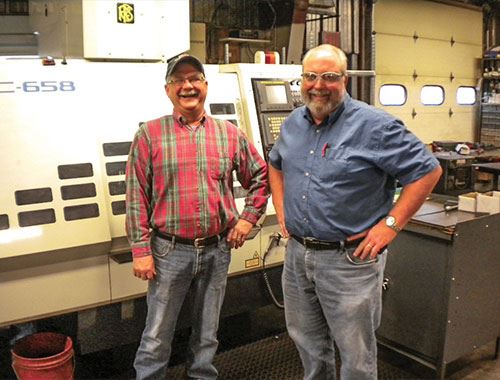
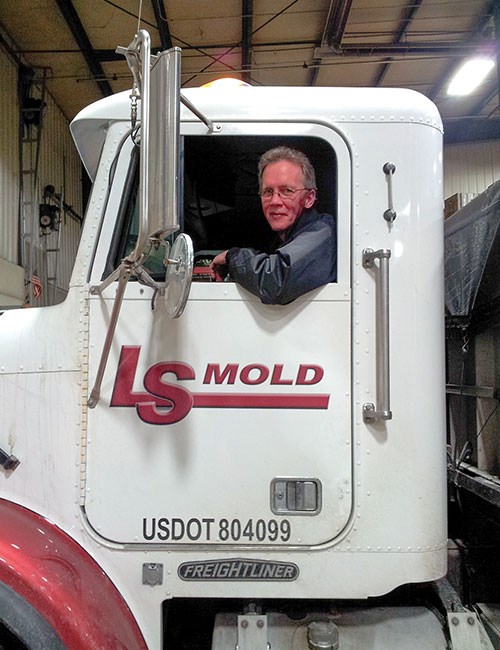
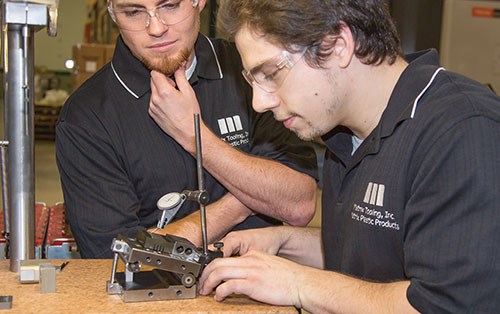
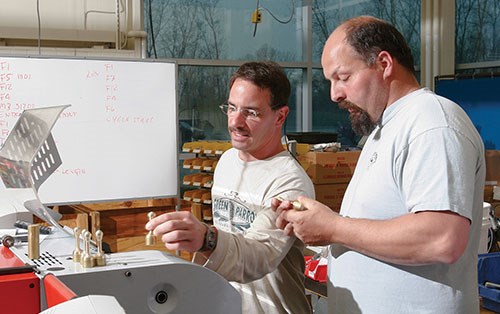












.jpg;maxWidth=300;quality=90)
.png;maxWidth=300;quality=90)



_300x250 1.png;maxWidth=300;quality=90)



